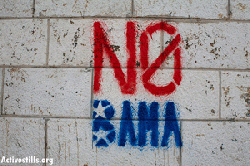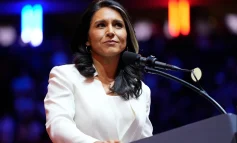RAMALLAH- U.S. President Barack Obama insisted on Thursday a two-state solution was still viable, but disappointed his Palestinian hosts by failing to take a clear stance on freezing settlement activity.
On the second day of a historic visit to Israel and the Palestinian territories, Obama traveled to the West Bank’s political capital to face an audience disappointed by his failure to meet expectations that he could help deliver them a state.
There he held a long meeting with Palestinian president Mahmoud Abbas who told him there would be no return to negotiations while Israel continues to build on land the Palestinians want for a future state.
After a brief flight from Jerusalem, crossing the barbed wire fences and walls of the Israeli separation barrier, Obama’s Marine One helicopter touched down under a blazing sun, kicking up a cloud of dust in the Muqataa presidential compound.
On his first visit to the Holy Land since taking the White House in 2009, Obama was quick to take aim at the disappointment over his first term in office, insisting Washington remained “deeply committed” to realizing the creation of an independent Palestinian state and an end to the Israeli occupation.
Speaking at a joint press conference with Abbas, Obama insisted that the two-state solution was still viable, saying the Palestinian people “deserve an end to the occupation.”
“Based on the conversations I’ve had with president Abbas and Prime Minister Benjamin Netanyahu… the possibility continues to exist for a two-state solution,” he said, countering claims it was no longer possible due to the pace of Israel’s settlement construction.
“The Palestinian people deserve an end to occupation and the daily indignities that come with it. Put simply, Palestinians deserve a state of their own,” he said.
Although he was quick to identify settlement construction as unhelpful to peace efforts, he steered clear of the question of a new settlement freeze.
“We do not consider continued settlement activity to be constructive, to be appropriate, to be something that can advance the cause of peace,” he said.
Direct peace talks broke off in late September 2010, just weeks after they were launched with the Palestinians refusing to continue talking while Israel builds on land they want for a future state.
Israel has said it is ready for an immediate resumption of talks, but insists it will only talk if there are no preconditions attached.
On the question of a new settlement freeze, Obama appeared to sidestep the issue, saying: If each party “is constantly negotiating about what’s required to get into talks in the first place, then we’re never going to get to the broader issue, which is how do you actually structure a state of Palestine.”
But during the talks, Abbas insisted there could be no negotiations without a freeze, his political adviser Nimr Hammad said shortly after Obama’s departure.
At the press conference, Abbas said peace needed “political courage” but also good faith to work.
“Peace is not forged through violence and occupation and walls, and not by denying the rights of refugees.”
Rockets hit southern Israel
Obama also condemned the “continuing threat” of rocket fire from the Hamas-run Gaza Strip after two rockets slammed into southern Israel.
A group with links to al Qaeda, called Magles Shoura al-Muhahddin, claimed responsibility for the strike on Sderot near the Gaza frontier which wounded no one but damaged the side of a building.
In an online statement, the movement said it had launched the rockets during Obama’s visit to show their attacks could not be stopped by Israeli air defenses – a possible reference to Israel’s partially U.S.-funded Iron Dome anti-missile battery.
Obama, who was in Jerusalem about 50 miles from Sderot when the rockets hit, later told journalists it was up to Hamas, which controls Gaza and rejects peacemaking with the Jewish state, to stop such strikes.
The attack was the second time rockets launched from Gaza have hit Israel since a truce ended an eight-day cross-border war in November. The Shoura group never signed the deal.
Israel responded by closing the Kerem Shalom crossing on its border with Gaza and limiting Palestinian fishing to three miles from the enclave’s shore, down from the six-mile zone its navy had previously enforced.

Obama inspected an Iron Dome anti-missile battery at Tel Aviv airport on Wednesday.
Abbas too condemned the rocket fire.
Protesters also made a showing in Ramallah where around 150 could be seen trying to get into the Muqataa shouting: “Obama, you’re not welcome here!” and: “Obama, get out of Ramallah!”
In an op-ed published on Wednesday, Palestinian negotiator Nabil Shaath urged Obama to prove his commitment to a two-state solution by turning pledges into deeds.
The Palestinians are hoping Obama will help broker the release of more than 1,000 prisoners held by Israel and also free up $700 million in blocked U.S. aid.
Next stop: Jordan
Obama was scheduled to fly to Jordan on Friday for talks with King Abdullah, a key U.S. Middle East ally, that are expected to focus on the civil war in neighboring Syria and the prospects for Israeli-Palestinian peace diplomacy.
The president’s visit to the desert kingdom is aimed at reassuring Abdullah of Washington’s support at a time when it is flooded with refugees from the violence in Syria, and battling economic difficulties and tensions from the “Arab Spring” upheaval in the region, aides say.
Obama and Abdullah will consult extensively on the spillover of the Syrian conflict to Jordan, where an influx of more than 350,000 refugees has further strained the resources of a country that has almost no oil. Washington has provided some aid to alleviate the humanitarian situation.
The king has taken a mostly cautious line on Syria, calling for Assad to go, but advocating a “political solution” and not arming the Syrian leader’s foes.
Jordan is one of only two Arab states – Egypt is the other – to have signed peace treaties with Israel, and is seen as a potential player in any future U.S.-led peace push. It also has a majority Palestinian population.
Showcase speech to Israelis
In a showcase speech in Jerusalem to Israeli university students on Thursday, Obama coupled his plea with an acknowledgement of the Jewish state’s security concerns in a region destabilized by the West’s nuclear standoff with Iran and civil strife in Syria.
During the speech, Obama said “Israel is the most powerful country in the region, and has the unshakable support of the strongest nation in the world.”
Obama said only peace could bring true security, but he did not offer any new ideas on how to revive Israeli-Palestinian peace negotiations, stalled since 2010.
“Given the demographics west of the Jordan River, the only way for Israel to endure and thrive as a Jewish and democratic state is through the realization of an independent and viable Palestine,” he said.
Obama also demanded that foreign governments brand the Lebanese movement Hizbullah as a “terrorist organization,” criticizing it for attacks on Israelis.
Speaking to Israeli students he said, “the world cannot tolerate an organization that murders innocent civilians, stockpiles rockets to shoot at cities, and supports the massacre of men, women and children in Syria.”
Earlier in a joint press conference with Israeli Prime Minister Benjamin Netanyahu on Wednesday, Obama said that while the U.S. “prefers to resolve” the Iran issue diplomatically, “all options are on the table” if diplomacy falls short.
Netanyahu said he was “absolutely convinced” that Obama was determined to prevent Iran from developing a nuclear weapon.
“Mr. President, you have made it clear that you are determined to prevent Iran from developing nuclear weapons. I appreciate your forthright position on this point,” Netanyahu said.
“And as you know, my view is that in order to stop Iran’s nuclear programme peacefully, diplomacy and sanctions must be augmented by clear and credible threat of military action.”
Before leaving Israel, Obama will visit the tombs of Theodor Hertzl, the founder of the Zionist movement, and slain Prime Minister Yitzhak Rabin. Palestinians lamented that Obama did not visit late Palestinian leader Yasser Arafat’s grave, considering he shared a Nobel Peace Prize with Rabin after the Oslo Accords peace agreement.
He is expected to place a wreath on Hertzl’s grave according to Reuters. He will also tour the Yad Vashem Holocaust memorial.
It is all part of paying tribute to Israeli and Jewish history in his outreach to the Israeli people, who gave him a rousing welcome despite lingering wariness about him.
He will then travel to West Bank town of Bethlehem to visit the Church of the Nativity, where Christians believe Jesus was born, in what is seen as a message of solidarity to dwindling Christian communities in a turbulent region. Obama will visit the ruins of the ancient city of Petra in southern Jordan on Saturday before heading home to Washington.
-MEO, Reuters, TAAN, Al Jazeera






Leave a Reply